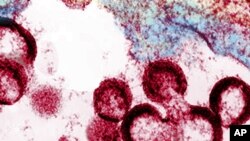Medical researchers in Spain say an experimental vaccine against HIV, the virus that causes AIDS, has produced a 90 percent immune response among a small group of healthy human test subjects. The promising results pave the way for further clinical trials on HIV-infected volunteers.
Researchers at the Spanish National Research Council's National Biotech Center say their MVA-B vaccine is made with bits of non-infectious HIV genetic material and is designed to train the body’s immune system over time to detect and fight different components of the virus. Lead scientist Mariano Esteban likens the vaccine's effectiveness to showing an HIV picture to the immune systems’ “soldiers,” so they will recognize it and be ready to attack if it appears again in the future.
The researchers conducted the clinical trial on a group of 30 HIV-free volunteers to test whether a healthy immune system is capable of reacting to the vaccine. The researchers say 85 percent of those who received the vaccine maintained their strong immune response to the virus for at least one year. Six of the 30 volunteers received a placebo instead of the vaccine. The test subjects were safe from accidentally contracting the virus because the four HIV genes used in the vaccine cannot self-replicate.
Esteban says he hopes the vaccine will eventually reduce HIV to "a minor chronic infection." Improved drug therapies have enabled people infected with HIV to live longer, but the disease remains incurable and new infection rates remain high in many parts of the world.
The United Nations World Health Organization estimates that more than 33 million people worldwide are infected with HIV.
The results of the experimental HIV vaccine trial appear in both the Journal of Virology and the journal Vaccine.
Spanish HIV Vaccine Shows 90 Percent Success in Early Trial









